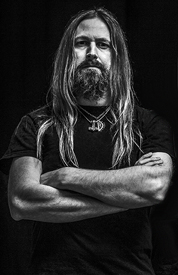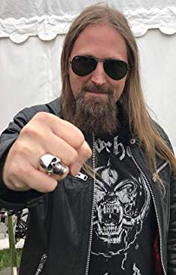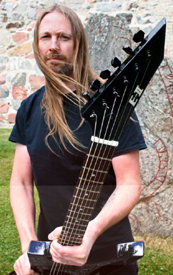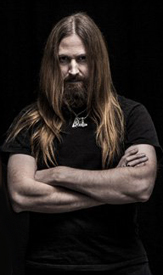|
Interview conducted June 6 2019 Interview published June 27 2019 |
![]()
Swedish melodic death metallers Amon Amarth put out their new record Berserker on May 3rd and accordingly an interview was published a few weeks earlier, featuring bass player Ted Lundström.
Yet, as there was open spot in early June at Sweden Rock Festival to talk to guitar player Johan Söderberg, Metal Covenant saw an opportunity to do another one, using a not so different set of questions. So, here's a chance to see if these two band members look at a couple of things in a similar way or from different angles.
![]()
Tobbe: What can you say about a new Amon Amarth record without coming out too cliché?
Johan: Well, we like that it is the same and we like that we are a little cliché. That's our style, you know, to keep the same concept. We want to have the AC/DC style and not change, although we change a little, but there isn't any bigger change.
 Tobbe:
Does it get easier or harder for you guys to make records? I mean, you
get more routine and experience for each record, but at the same time
there's a greater risk to repeat yourself and end up in the same kind
of track.
Tobbe:
Does it get easier or harder for you guys to make records? I mean, you
get more routine and experience for each record, but at the same time
there's a greater risk to repeat yourself and end up in the same kind
of track.
Johan: Well, it's always difficult to come up with riffs and stuff that you haven't heard before. Oftentimes it's like "This is similar to that song. This is too similar to that one.". But in recent years we stopped caring about if it's a little bit similar to something else. Nowadays we're thinking more in terms of "Is this good or not?".
And we have also stopped caring about if it sounds like some other band, like "This is too much Iron Maiden." and 10 years ago we wouldn't have used that stuff, but today we don't give a shit if it's too similar to Iron Maiden. If we think it's good we will just keep it the way it is.
Tobbe: You and Olli [Olavi Mikkonen, also guitar] write the music and it's pretty funny that the info sheet for Berserker says that Ted is also contributing to the songwriting.
Johan: Yes, but that's because we share the royalties. The royalties go into the band; I don't receive them personally, you know. Everything goes into the band and then we pay salaries to everyone. That's why it says so. Previously it was more like: maybe I've done a half song and then Olli the other half, on some songs. And some songs I have done myself and some songs he has done himself.
On this record actually Olli wrote all his songs all by himself and I wrote all my songs all by myself and then Skägget ["The beard". Nickname for vocalist Johan Hegg.] of course wrote the lyrics. But everyone can change stuff a little bit, like "We ditch this part. Let's do this part twice instead.". With stuff like that everyone can contribute to.
 Tobbe:
Amon Amarth's music is heavy, fast and melodic and how many albums can
a band make with this kind of style without having to change more than
you have done on the last couple of albums?
Tobbe:
Amon Amarth's music is heavy, fast and melodic and how many albums can
a band make with this kind of style without having to change more than
you have done on the last couple of albums?
Johan: I think we could go on forever. Just look at AC/DC, you know. They've been doing their style since forever. They're not changing anything. And nor does Slayer, really. I think it's good to have your own style, so people recognize it, like "This is Amon Amarth and they sound like this.". If you look at a blues artist. Blues is always the same chords; it's just different sounds, you know.
Tobbe: When you release a new record today, do you release that record because you really, really want to make another record, or do you release a record just because of it, like "That's the way it's supposed to be."?
Johan: We have kind of a cycle, you know. We release a record and then we tour that record for 2-2,5 years. And when you've done that you're starting to get tired of touring, like "Oh damn, touring is tiresome!" and then you want to start writing songs instead. And then you're doing that for a year, just sitting at home writing, then you're recording, and then you're kind of fed up with writing songs and then you're feeling like going out playing again.
Tobbe: It's one thing when you're younger, but how are you able to get that urge to be out on the road when you've passed 40?
Johan: I enjoy being on stage, you know. And to see the audience, I get a kick from it. Even though you're so sick of touring when you've done it for 2 years on a record and just want to go home, when you've been at home for a year you get the urge back. You start longing for that damn tour bus, you know. Sometimes when we're home we visit other bands that come to town and hang out in their tour bus and, like "This is really great! I wanna get back to the tour bus too.".
Tobbe: Over the years you have added more regular heavy metal to your music, although intense heavy metal, but you started out as a death metal band, so where do you think Amon Amarth's music will end up in the end?
Johan: I don't know, really. The thing with heavy metal influences is that that's the kind of music we like to listen to ourselves. Like I said, we used to think like "We can't use this because it sounds too similar to Iron Maiden or Judas Priest.", but in the last couple of years when we stopped caring about that our music sounds more heavy metal. But, you know, Skägget can't sing heavy metal vocals. He's number one in the world when it comes to growl vocals, but he will never be able to sing like Bruce Dickinson.
I think we can't change so much more, really. Maybe a little bit more towards heavy metal. I think the last 3 albums are in the same kind of style and I think we will keep that for a couple of albums more and we won't go back closer towards raging death metal, you know.
Tobbe: Besides getting more skilled as players, how do you think that the early records like Once Sent From The Golden Hall [1998] and The Avenger [1999] would sound like if you had made them today? Even though you personally weren't in the band on the first record…
Johan: Everything is clearer now, you know. On Avenger, for example, we added a lot of guitar stuff that made everything kind of blurry. And we never played single notes in the melodies, but it was more kind of a constant chewing. Now we play long notes instead, in certain parts, to bring forth melodies.
Tobbe: This change of style has made the band bigger.
Johan: Yes, I think so too. It's definitely more appealing to a broader audience. If you listen to the old records on a crappy stereo it sounds very buzzing, you know. It's hard to distinguish anything. It's just a fucking roar and bellow of rage. That's appealing to a certain audience, but more people are attracted by hearing, you know, clear melodies and hearing what the singer is singing, although he's growling.
His voice has gone through a great development over the years. In the beginning it was mostly just shouting. Just bawling, you know, whereas now he has a great technique.
Tobbe: I'm drawing a parallel to In Flames, even if they have changed style a lot more than you guys have, but at the same time, like you said, it attracts a larger audience, and is this something that's considered when you're writing the songs?
Johan: At least that it will interact with the audience. Nowadays we make riffs more like "This is catchy. This will get people going. They want to jump to this. They want to sing along to this.". That's the way we're thinking. In the beginning we were, you know, death metal and everyone was looking at the floor and spinning their head and with their hair in their face all the time.
It works fine when you play in a small indoor club, but when you play at those big arenas and shit, like with a large Iron Maiden production, you can't act like that all the time, but you've got to interact more with the audience. Even if I sometimes headbang, I look at the audience through the hair anyway and I never just look down at the floor, you know.
 Tobbe:
A lot of bands are popular for, like, 5-10 years, besides giants like
Metallica and Iron Maiden, and where in this span is Amon Amarth today?
Are you worried about losing the grip, or are you perhaps just trying
to secure your position, or do you believe that you can make it even bigger?
Tobbe:
A lot of bands are popular for, like, 5-10 years, besides giants like
Metallica and Iron Maiden, and where in this span is Amon Amarth today?
Are you worried about losing the grip, or are you perhaps just trying
to secure your position, or do you believe that you can make it even bigger?
Johan: Our goal is always to grow with every album we put out. At some time in the future it will obviously decrease, but so far we have grown with every album we've released up to now and I think we can still grow for at least a couple of years more.
Tobbe: Do metal fans get older and older or is that just something I misperceive?
Johan: The thing with us is that now we have just reached a place where we have started to get a regeneration. People who started listen to us in the beginning have gotten kids who also have started to listen to us. On the last album [Jomsviking, 2016] suddenly there were 12-13-year-old kids in the first row, who sang along to the songs, you know.
It's awesome, because that's the absolute best you can get; that the ones who were older than us when we began still listen to us, and that the ones who were in the same age as us still listen to us too, and then their kids listen to us as well. I started to listen to Iron Maiden when I was around 12 and now my daughter is around the age where she, even if she listens to other music for the most part, could go to an Iron Maiden concert if she wants to.
I have friends whose kids listen a lot to us as well and my neighbor's kid also listens to us and they're, you know, 12-15 years old. It's perfect, as we will keep on growing as long as they grow up.
Tobbe: When you have reached a certain, pretty high level in your career, is it easy to relax too much and lose focus?
Johan: Yes, it's probably easy, but we think about it. We think, you know, "We can't start to relax now, just because things are going well. We must always keep working.".
 Tobbe:
You guys were over 30 when things started to happen on a larger scale
and in what way was it good for the band that you had reached a certain
age before success came?
Tobbe:
You guys were over 30 when things started to happen on a larger scale
and in what way was it good for the band that you had reached a certain
age before success came?
Johan: If we had been this successful as we are today when we were 23, we would have died by drugs and alcohol within a year, you know. Not because we're doing drugs in that way, but we would have certainly been exposed to it and everything would just have been a big party. Now we're so old that we can't party in that way. So I think it's better to reach success later in your career.
Tobbe: Do you sometimes feel that you're kind of living in a bubble or in your own world?
Johan: We probably do, but we don't feel like it. I feel like a regular dude. When I'm with my buddies at home, they don't think I'm different in any way. We see it just like any other job, although we think it's a really great job.
Tobbe: Is there anything that could make you give up this career and do something else outside of the music?
Johan: Well, maybe if the fans just stopped listen to us and we simply couldn't keep doing this. Then I would have to do something else, you know. I have quite a lot of spare time when I'm home and then I'm able to do a lot of other stuff.
When we've finished an album and started touring, I don't sit there writing songs when I come home, but when the whole touring cycle is over, then we start writing songs. It would have been too much, I think, if we would have been touring and writing songs at the same time. You would get tired of it; the same, you know, with just music all the time.
![]() See
also: interview with
Ted Lundström
See
also: interview with
Ted Lundström
Related links:
www.amonamarth.com
www.facebook.com/amonamarth
![]()